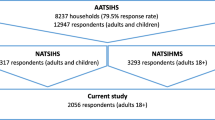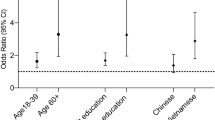Abstract
It is widely accepted that socioeconomic status (SES) is a fundamental cause of health inequality. There is evidence, however, that race is also a fundamental cause of disparities in health. Based on this idea, the weathering hypothesis developed by Geronimus and her colleagues views the elevated rates of illness and disability seen among Black Americans as a physiological response to the structural barriers, daily slights, and other threats to identity that comprise the Black experience. The current study tests the weathering hypothesis using chronic inflammation as an indicator of biological weathering. Specifically, we examine the extent to which persistent exposure to racial discrimination predicts elevated inflammation and, in turn, diagnosed chronic illness, after taking into account SES and several control variables. This mediation model was tested using zero-inflated Poisson path modeling with five waves of data collected from 391 African American women participating in the Family and Community Health Study (FACHS). A 13-item index was used to assess exposure to racial discrimination across 8 years. ELISA blood assays of seven cytokines central to the inflammatory response were used to construct an inflammatory index. Respondents reported their diagnosed chronic diseases. Consonant with the weathering hypothesis, persistent exposure to discrimination predicted inflammation which, in turn, predicted number of chronic diseases. This indirect effect was statistically significant. SES predicted having a chronic disease and the various controls showed no effect. The findings support the idea that race, like SES, is a fundamental cause of health inequalities.

Similar content being viewed by others
References
Williams DR. Miles to go before we sleep: racial inequities in health. J Health Soc Behav. 2012;53:279–95.
Howard G, Safford MM, Moy CS, Howad VJ, Kleindorder DO, et al. J Am Geriatr Soc. 2017;65:83–90.
Carethon MR, Howard G, Albert MA, Anderson CAM, Bertoni AG, et al. Cardiovascular health in African Americans: a scientific statement from the American Heart Association. Curculation. 2017. https://doi.org/10.1161/CIR.000000000000534.
Lim E, Gandhi K, David J, Chen JJ. Prevalence of chronic conditions and multimorbidities in a geographiclly defined geriatric population with diverse races and enthicities. J Aging Health. 2018;30:421–44.
Thorpe RJ, Gesahazion RG, Parker L, Wilder T, Rooks RN, Bowie JV, et al. Accelerated health declines among African Americans in the USA. J Urban Health. 2016;93:808–19.
Geronimus AT, Hicken MT, Pearson JA, Seashols SJ, Brown KL, Cruz TD. Do US black women experience stress-related accelerated biological aging? Hum Nat. 2010;21:19–38.
Cockerham WC, Hamby BW, Oates GR. The social determinants of chronic illness. Am J Prev Med. 2017. https://doi.org/10.1016/j.amepre.2016.09.010.
Bodai MD, Lawenda S, Rehbein M, Vif P, Greger M. Lifestyle medicine: a brief review of its dramatic impact on health and survival. Perm J. 2018;22:17–025.
Link BG, Phelan JC. Social conditions as fundamental causes of disease. J Health Soc Behavior. 1995;35:80–4.
Pelan JC, Link BG, Tehranifar TP. Social conditions as fundamental causes of health inequalities: theory, evidence, and policy implications. J Health Soc Behav. 2010;51:S28–40.
Phelan JC, Link BG. Is racism a fundamental cause of inequalities in health? 2015;41:311–30.
Geronimus AT, James S, Destin M, Graham L, Hatzenbuehler M, Murphy M, et al. Jedi public health: co-creating an identity-safe culture to promote health equity. SSM Popul Health. 2016;2:105–16.
Geronimus AT, Thompson JP. To denigrate, ignore, or disrupt: racial inequality in health and the impact of policy-induced breakdown of urban African American communities of support. Du Bois Rev. 2004;1(2):247–79.
Geronimus AT, Hicken M, Keene D, Bound J. “Weathering” and age patterns of allostatic load scores among Blacks and Whites in the United States. 2006. https://doi.org/10.2105/AJPH.2004.060749.
Ferrucci L, Fabbri E. Inflammaging: chronic inflammation in ageing, cardiovascular disease, and fraity. Natl Rev Cardiol. 2018;15:505–22.
Franceschi C, Campisi J. Chronic inflammation (inflammaging) and its potential contribution to age-associated diseases. J Gerontol A Biol Sci Med Sci. 2014;69(1):S4–9.
Liu Y-Z, Wang Y-X, Jiang C-L. Inflammation: the common pathway of stress-related diseases. Front Human Neurosci. 2017. https://doi.org/10.3389/fnhum.2017.00316.
Nowakowski ACH, Sumerau JE. Swell foundations: funadmental causes and chronic inflammation. Sociol Spectr. 2015;35:161–78.
Paalani M, Lee JW, Haddad E, Tonstad S. Determinants of inflammatory markers in a bi-ethnic population. Ethn Dis. 2011;21(2):142–9.
Hayflick L. Biological aging is no longer an unsolved problem. Ann NY Acad Sci. 2007;1100:1–13.
Kennedy BK, Berger S, Brunet A, et al. Geroscience: linking aging to chronic disease. Cell. 2014;159:709–13.
Browning CR, Cagney KA, Iveniuk J. Neighborhood stressors and cardiovascular health: crime and C-reactive protein in Dallas, USA. Soc Sci Med. 2012;75(7):1271–9.
Cole SW. Human social genomics. PLoS Genet. 2014;10(8):e1004601.
Powell ND, Sloan EK, Bailey MT, Arevalo JMG, Miller GE, Chen E, et al. Social stress up-regulates inflammatory gene expression in the leukocyte transcriptome via β-adrenergic induction of myelopoiesis. Proc Natl Acad Sci USA. 2013;110(41):16574–9.
Slavich GM, Cole SW. The emerging field of human social genomics. Clin Psychol Sci. 2013;1:331–48.
Carroll G. Mundane extreme environmental stress and African American families: a case for recognizing different realities. J Comp Fam Stud. 1998;29:271–84.
Emerson KTU, Murphy MC. Identity threat at work: how social identity threat and situational cues contribute to racial and ethnic disparities in the workplace. Cult Divers Ethn Minor Psychol. 2014;20:508–20.
Brody GH, Yu T, Miller GE, Chen C. Discrimination, racial identity, and cytokine levels among African-American adolescents. J Adolesc Health. 2015;56:496–501.
Lewis TT, Aiello AE, Leurgans S, Kelly J, Barnes LL. Self-reported experiences of everyday discrimination are associated with elevated C-reactive protein levels in older African-American adults. Brain Behav Immun. 2010;24(3):438–43.
Albert MZ, Ravenell J, Glynn RJ, Khera A, Halevy N, de Lemos JA. Cardiovascular risk indicators and perceived discrimination in the Dallas heart study. Am Heart J. 2008;156:1103–9.
Cunningham TJ, Seeman TE, Kawachi I, Gortmaker SL, Jacobs DR, Kiefe CI, et al. Racial/ethnic and gender differences in the association between self-reported experiences of racial/ethnic discrimination and inflammation in the Cardia cohort of 4 US communities. Soc Sci Med. 2012;75:922–31.
Kershaw KN, Lewis TT, Diez Roux AV, Jenny NS, Liu K, Penedo FJ, et al. Self-reported experiences of discrimination and inflammation among men and women: the multi-ethnic study of atherosclerosis. Health Psychol. 2016;35:343–50.
Moody DLB, Brown C, Matthews KA, Bromberger JT. Everyday discrimination prospectively predicts inflammation across 7 years in racially diverse midlife women: study of women’s health across the nation. J Soc Issues. 2014;70:298–314.
Simons RL, Lei MK, Beach SRH, Barr AB, Simons LG, Gibbons FX, et al. Discrimination, segregation, and chronic inflammation: testing the weathering explanation for the poor health of Black Americans. Dev Psychol. 2018;54:1993–2006.
Williams DR, Yu Y, Jackson JS, Anderson NB. Racial differences in physical and mental health: socio-economic status, stress and discrimination. J Health Psychol. 1997;2:335–51.
Abbas AK, Lichtman AH, Pillai S. Cellular and molecular immunology. 8th ed. Philadelphia: Elsevier; 2015.
Gibbons FX, Gerrard M, Cleveland MJ, Wills TA, Brody G. Perceived discrimination and substance use in African American parents and their children: a panel study. J Pers Soc Psychol. 2004;86(4):517–29.
Simons RL, Lei MK, Beach SRH, Brody GH, Philibert RA, Gibbons FX. Social environment, genes, and aggression: evidence supporting the differential susceptibility perspective. Am Sociol Rev. 2011;76(6):883–912.
Miller GE, Brody GH, Yu T, Chen E. A family-oriented psychosocial intervention reduces inflammation in low-SES African American youth. Proc Natl Acad Sci. 2014;31:11287–92.
Landrine H, Klonoff EA. The schedule of racist events: a measure of racial discrimination and a study of its negative physical and mental health consequences. J Black Psychol. 1996;22:144–68.
Brody GH, Chen Y-F, Murry VM, et al. Perceived discrimination and the adjustment of African American youths: a five-year longitudinal analysis with contextual moderation effects. Child Dev. 2006;77(5):1170–89.
Simons RL, Murry V, McLoyd V, Lin KH, Cutrona C, Conger RD. Discrimination, crime, ethnic identity, and parenting as correlates of depressive symptoms among African American children: a multilevel analysis. Dev Psychopathol. 2002;14(2):371–93.
Diederichs CP, Wellmann J, Bartels DB, Ellert U, Hoffman W, Berger K. How to weight chronic disease in multimorbidity indices? Development of a new method on the basis of individual data from five population-based studies. J Clin Epidemiol. 2012;65:679–85.
Burt HC, Simons RL, Gibbons FX. Racial discrimination, ethnic-racial socialization, and crime. Am Sociol Rev. 2012;77:648–77.
Conger RD, Elder GH, Lorenz FO, Simons RL, Whitbeck LB. Famililes in troubled times: adapting to change in rural America. Aldine de Gruyter: Hawthorne; 1994.
Centers for Disease Control and Prevention. BMI—Body Mass Index: BMI for Adults. Department of Health and Human Services Web site. 2004. http://www.cdc.gov/nccdphp/dnpa/bmi/bmi-adult-formula.htm.
Loeys T, Moerkerke B, DeSmet O, Buysse A. The analysis of zero-inflated count data: beyond zero inflated Poisson regression. Br J Math Stat Psychol. 2012;1:163–80.
Muthen LK, Muthen BO. Mplus version 7.04: base program and combination add-on. Los Angeles: Muthen & Muthen; 2018.
Browne MW, Cudeck R. Alternative ways of assessing model fit. Soc Methods Res. 1992;21:230–58.
Lee S, Lei MK, Brody GH. Constructing confidence intervals for effect size measures of an indirect effect. Multivar Behav Res. 2015;50:600–13.
Alexander M. The new Jim Crow. New York: The New Press; 2010.
Western B, Wildeman C. The black family and mass incarceration. Ann Am Acad Polit Soc Sci. 2009;621:221–42.
Hilmer A, Hilmers D, Dave J. Neighborhood disparities in access to healthy foods and their effects on social justice. Am J Public Health. 2012;102:1644–54.
Sequin R, Connor L, Nelson M, LaCroix A, Eldridge G. Understanding barriers and facilitators to healthy eating and active in rural communities. J Nutr Metab. 2014. https://doi.org/10.1155/2014/146502.
Walker, RE, Keane, CR, Burke, JG. Disparities and access to healthy food in the United States: a review of food deserts literature. 2010;16:876–884.
Simons RL, Lei KM, Carter S, Beach SRH, Gibbons FX, Gerrard M, et al. Inflammation mediates the effect of discrimination, religiosity, and friendship network on expression of the TP53 cancer suppression gene. SSM- Popul Health. 2019;7:1–6. https://doi.org/10.1016/j.ssmph.2019.100389.
Beach SRH, Lei M-K, Simons RL, Cutrona CE, Philibert RA. Perceived relationship support moderates the association of contextual stress with inflammation among African Americans. J Fam Psychol. 2019;33:338–48. https://doi.org/10.1037/fam0000509.
Funding
This work was supported by the National Institute on Aging (R01 AG055393), the National Heart, Lung, Blood Institute (R01 HL118045), the National Institute on Child Health and Human Development (R01 HD080749), the National Institute on Drug Abuse (R21 DA034457), and the National Institute of Mental Health (R01 MH62699, R01 MH62666). The content is solely the responsibility of the authors and does not necessarily represent the official views of the National Institutes of Health.
Author information
Authors and Affiliations
Corresponding author
Ethics declarations
All procedures performed in this study involving human participants were in accordance with the Institutional Review Board of the University of Georgia.
Conflict of Interest
The authors declare that they have no conflicts of interest
Additional information
Publisher’s Note
Springer Nature remains neutral with regard to jurisdictional claims in published maps and institutional affiliations.
Electronic Supplementary Material
ESM 1
(DOCX 21 kb)
Rights and permissions
About this article
Cite this article
Simons, R.L., Lei, MK., Klopack, E. et al. Racial Discrimination, Inflammation, and Chronic Illness Among African American Women at Midlife: Support for the Weathering Perspective. J. Racial and Ethnic Health Disparities 8, 339–349 (2021). https://doi.org/10.1007/s40615-020-00786-8
Received:
Revised:
Accepted:
Published:
Issue Date:
DOI: https://doi.org/10.1007/s40615-020-00786-8




